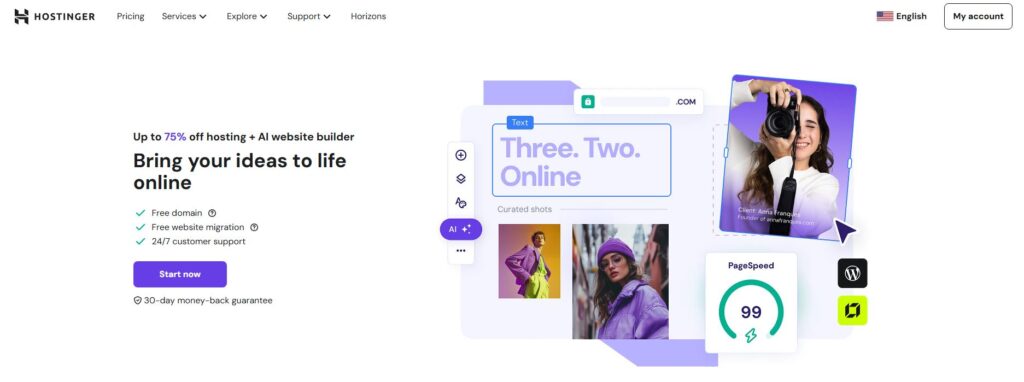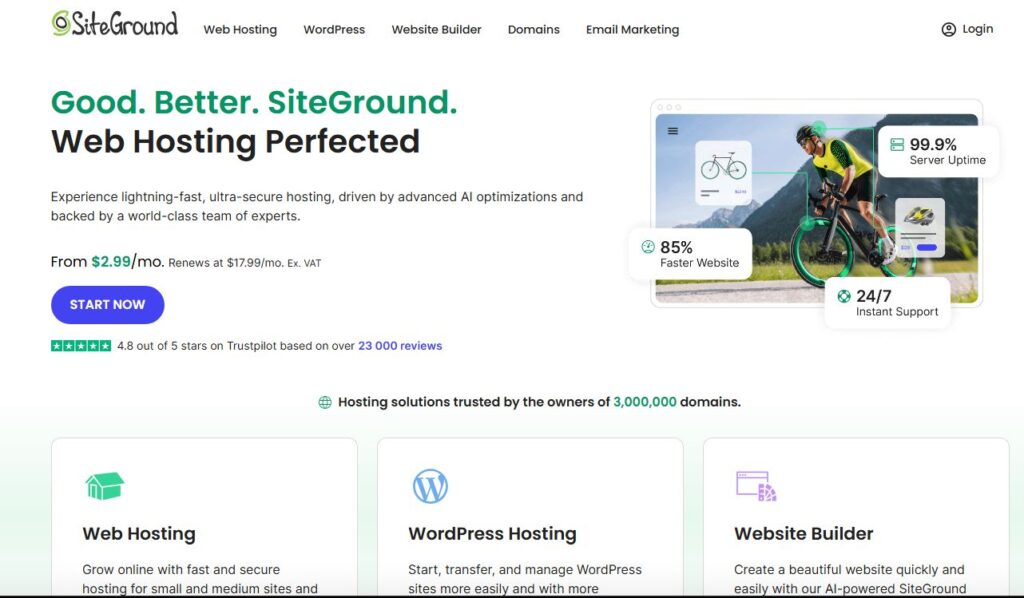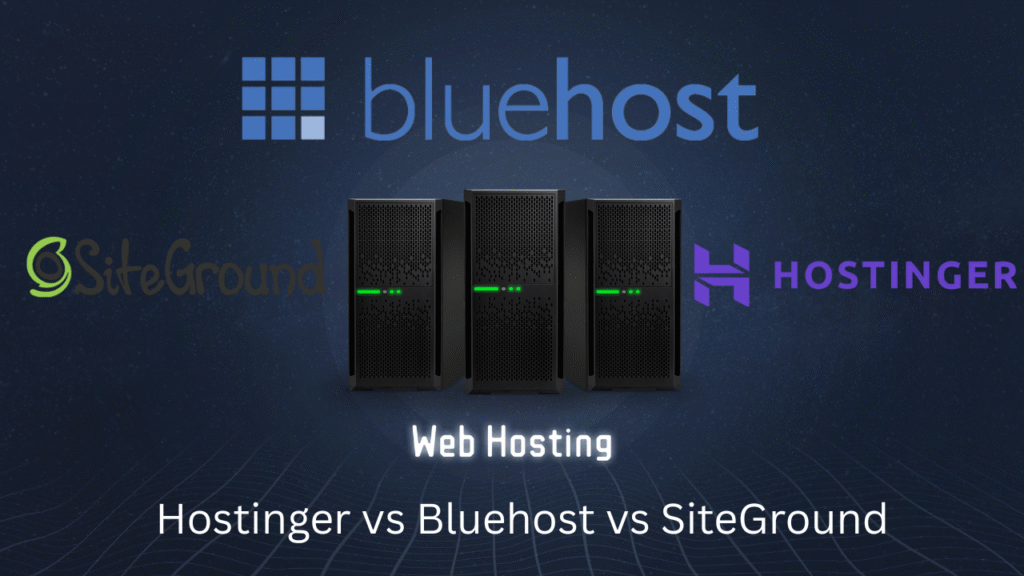Choosing the right web hosting provider in 2025 is critical for businesses, bloggers, and developers aiming to establish a strong online presence. With the web hosting market projected to grow at a 15.5% CAGR through 2030, selecting a provider that balances affordability, performance, and reliability is more important than ever. This SEO-optimized guide compares Hostinger vs Bluehost vs SiteGround to determine the best web hosting in 2025. We evaluate their features, pricing, performance, and suitability for different use cases to help you make an informed decision.
Why Choosing the Right Web Hosting Matters in 2025
Web hosting is the backbone of your website’s performance, impacting speed, uptime, security, and user experience. For SaaS businesses, e-commerce stores, or personal blogs, the right host can reduce bounce rates, boost SEO rankings, and enhance customer trust.
Here’s why selecting the best web hosting provider is crucial:
- Speed and Performance: Fast load times improve user experience and SEO (e.g., Google’s Core Web Vitals).
- Uptime Reliability: 99.9%+ uptime ensures your site is always accessible.
- Security: SSL certificates, DDoS protection, and backups safeguard your data.
- Scalability: Support for growing traffic and resource demands.
- Ease of Use: Intuitive dashboards simplify website management.
- Support: 24/7 customer support resolves issues quickly.
- Affordability: Competitive pricing maximizes ROI for startups and small businesses.
With trends like AI-driven search, mobile-first indexing, and increased cyber threats shaping 2025, choosing a host like Hostinger, Bluehost, or SiteGround can make or break your online success. Let’s dive into our in-depth comparison.
How We Evaluated Hostinger, Bluehost, and SiteGround
To determine the best web hosting in 2025, we assessed Hostinger, Bluehost, and SiteGround based on:
- Performance: Uptime, speed (TTFB, LCP), and server reliability.
- Pricing: Affordability, renewal costs, and value for money.
- Features: Free SSL, domain, backups, CDN, and WordPress integration.
- Ease of Use: User-friendly dashboards and onboarding processes.
- Customer Support: Availability and responsiveness via chat, email, or phone.
- Scalability: Support for shared, VPS, cloud, and dedicated hosting.
- User Reviews: Ratings from G2, Capterra, and TrustRadius.
- 2025 Relevance: Alignment with trends like AI optimization and global data centers.
Our analysis draws from 2025 testing data, user feedback, and industry reports, ensuring an unbiased comparison.
Hostinger vs Bluehost vs SiteGround: A Detailed Comparison
1. Hostinger: Best for Budget-Friendly Hosting

Why It’s Great: Hostinger is renowned for its affordability and impressive performance, making it a top choice for startups, bloggers, and small businesses in 2025. Its global data centers and LiteSpeed servers enhance speed and reliability.
Key Features:
- Pricing: Starts at $2.69/month (Premium Web Hosting, 48-month plan).
- Storage: 100 GB SSD (Premium plan); up to 200 GB NVMe (Business plan).
- Free Features: SSL certificate, domain (select plans), weekly backups, and Cloudflare CDN.
- Control Panel: Custom hPanel for intuitive management.
- Performance: 100% uptime, 35ms average response time, and 670ms LCP.
- Data Centers: 10 global locations (US, UK, Brazil, Netherlands, Germany, France, Singapore, India, Indonesia, Malaysia).
- Integrations: WordPress, Google Analytics, and AI website builder.
- Security: BitNinja, SpamAssassin, and GDPR compliance.
Performance: Hostinger achieves a 4.6/5 rating on G2, praised for its speed and affordability. Testing shows a TTFB of 168ms and 97% PageSpeed Insights score.
Pros:
- Cheapest introductory pricing ($2.69/month).
- Fast LiteSpeed servers with server-level caching.
- Multiple data centers for low latency.
- Free domain and SSL on most plans.
- Beginner-friendly hPanel.
Cons:
- Renewal prices increase (e.g., $8/month for Premium).
- Limited storage on entry-level plans.
- Email hosting costs extra ($1/email/month).
Why Choose Hostinger?: Hostinger is the best web hosting for startups and budget-conscious users, offering unbeatable value and performance for small to medium-sized websites.
2. Bluehost: Best for WordPress Beginners

Why It’s Great: Bluehost is a WordPress.org-recommended host, ideal for beginners and small businesses building WordPress sites. Its 2025 updates improve onboarding and e-commerce features.
Key Features:
- Pricing: Starts at $2.95/month (Basic, 12-month plan).
- Storage: 10 GB NVMe (Basic); up to 100 GB (Pro).
- Free Features: SSL, domain, and CDN; free migration for WordPress sites.
- Control Panel: Modified cPanel with AI-powered onboarding.
- Performance: 100% uptime, 144ms response time, and 2.094s LCP.
- Data Centers: 6 locations (US, India, UK, Hong Kong, China).
- Integrations: WordPress, WooCommerce, Google Ads, and Microsoft 365.
- Security: SiteLock, DDoS protection, and optional daily backups.
Performance: Bluehost earns a 4.4/5 rating on Capterra, lauded for its WordPress integration but criticized for slower speeds compared to Hostinger.
Pros:
- WordPress-recommended with one-click installation.
- Free domain and migration for new users.
- Beginner-friendly dashboard with guided setup.
- Scalable plans for e-commerce and high-traffic sites.
Cons:
- Higher renewal prices (e.g., $10.99/month for Basic).
- Limited data center options, impacting global latency.
- No daily backups on the Basic plan.
Why Choose Bluehost?: Bluehost is the best web hosting for WordPress beginners, offering seamless integration and a user-friendly experience, though it lags in speed for global audiences.
3. SiteGround: Best for Performance and Support

Why It’s Great: SiteGround excels in speed, security, and customer support, making it ideal for businesses prioritizing performance and reliability. Its 2025 updates enhance WordPress optimization.
Key Features:
- Pricing: Starts at $3.99/month (StartUp, 12-month plan).
- Storage: 10 GB SSD (StartUp); up to 40 GB (GoGeek).
- Free Features: SSL, CDN, daily backups, and email accounts.
- Control Panel: Custom Site Tools dashboard.
- Performance: 99.99% uptime, 1.7s TTFB, and 68% PageSpeed Insights score.
- Data Centers: 6 locations across four continents.
- Integrations: WordPress, Weebly, and Cloudflare.
- Security: AI-driven anti-bot protection, daily backups, and advanced caching.
Performance: SiteGround earns a 4.7/5 rating on TrustRadius, praised for its support and speed but noted for higher renewal costs.
Pros:
- Superior customer support via live chat, email, and phone.
- Daily backups and advanced security on all plans.
- Optimized for WordPress with SuperCacher technology.
- Scalable for high-traffic sites.
Cons:
- Higher renewal prices (e.g., $18/month for StartUp).
- Limited storage compared to Hostinger.
- No VPS or dedicated hosting options.
Why Choose SiteGround?: SiteGround is the best web hosting for performance-driven businesses, offering top-tier support and speed, though it’s pricier.
Detailed Comparison: Hostinger vs Bluehost vs SiteGround
Pricing and Value for Money
- Hostinger: Offers the lowest introductory prices ($2.69/month for Premium Web Hosting), with 100 GB SSD storage and a free domain. Renewals are higher ($8/month), but it remains the most affordable.
- Bluehost: Starts at $2.95/month (Basic), including 10 GB NVMe storage and a free domain. Renewal prices jump to $10.99/month, making it less cost-effective long-term.
- SiteGround: Begins at $3.99/month (StartUp) with 10 GB SSD storage and daily backups. Renewals are steep ($18/month), but premium features justify the cost for some.
Winner: Hostinger for affordability and value, especially for long-term plans.
Performance and Speed
- Hostinger: Achieves a 35ms response time and 670ms LCP, thanks to LiteSpeed servers and NVMe storage. Its 10 global data centers minimize latency.
- Bluehost: Records a 144ms response time and 2.094s LCP, suitable for most sites but slower than Hostinger, especially for non-US audiences.
- SiteGround: Offers a 1.7s TTFB and 68% PageSpeed Insights score, competitive but slower than Hostinger due to Linux-based servers.
Winner: Hostinger for superior speed and global performance.
Features and Freebies
- Hostinger: Free SSL, domain (select plans), weekly backups, and Cloudflare CDN. Includes AI website builder and WordPress optimization.
- Bluehost: Free SSL, domain, CDN, and migration for WordPress sites. Offers e-commerce tools like WooCommerce integration.
- SiteGround: Free SSL, CDN, daily backups, and unlimited email accounts. Includes advanced WordPress features and SuperCacher.
Winner: SiteGround for premium features like daily backups and advanced caching.
Ease of Use
- Hostinger: hPanel is intuitive and beginner-friendly, with a clean design similar to cPanel.
- Bluehost: Modified cPanel with AI-guided onboarding is ideal for WordPress novices.
- SiteGround: Site Tools dashboard is user-friendly but lacks cPanel, which may affect users familiar with traditional hosting interfaces.
Winner: Bluehost for its beginner-focused onboarding and cPanel access.
Customer Support
- Hostinger: 24/7 live chat and email support, with a detailed knowledge base. Response times average under 3 minutes, but live chat is customer-only.
- Bluehost: 24/7 live chat, email, and phone support, with a rich knowledge base. Slightly faster live chat access than SiteGround.
- SiteGround: 24/7 live chat, email, and phone support, with a 99.7% customer happiness rate. Knowledge base is comprehensive but prioritized before live support.
Winner: SiteGround for its responsive, multi-channel support.
Scalability
- Hostinger: Offers shared, VPS, cloud, and WordPress hosting, supporting up to 100 websites on higher plans.
- Bluehost: Provides shared, VPS, dedicated, and WooCommerce hosting, ideal for high-traffic sites.
- SiteGround: Limited to shared, cloud, and WordPress hosting, with no VPS or dedicated options.
Winner: Bluehost for its broader range of scalable hosting options.
Which Host is Best for Your Needs?
- Bloggers and Startups: Hostinger’s affordability ($2.69/month) and performance make it ideal for personal blogs and small SaaS sites.
- WordPress Users: Bluehost’s WordPress recommendation, free migration, and cPanel make it the go-to for beginners.
- Businesses and High-Traffic Sites: SiteGround’s premium features and support suit businesses prioritizing reliability and speed.
- E-commerce: Bluehost’s WooCommerce integration and scalability are perfect for online stores.
- Developers: SiteGround’s advanced caching and staging tools cater to developers, though Hostinger’s hPanel is also developer-friendly.
How to Choose the Best Web Hosting in 2025
- Define Your Needs: Prioritize speed, affordability, or features based on your website type (blog, e-commerce, SaaS).
- Test Performance: Use tools like GTMetrix to check TTFB and LCP for your target host.
- Consider Data Centers: Choose a host with servers near your audience (e.g., Hostinger for global reach).
- Check Freebies: Look for free SSL, domain, and backups to reduce costs.
- Evaluate Support: Ensure 24/7 support via multiple channels for quick issue resolution.
- Plan for Scalability: Select a host with VPS or cloud options for future growth.
- Use Trials: Take advantage of 30-day money-back guarantees to test services risk-free.
Pro Tip: Start with Hostinger’s 48-month plan for the lowest rates, or try Bluehost’s 12-month plan for WordPress sites. Use SiteGround for performance-critical projects.
Common Mistakes to Avoid When Choosing a Web Host
- Focusing Only on Price: Cheap hosts may compromise on speed or support.
- Ignoring Renewal Costs: High renewals (e.g., SiteGround’s $18/month) can strain budgets.
- Overlooking Data Centers: Hosts with limited locations may cause latency for global users.
- Skipping Backups: Ensure daily or weekly backups to protect data.
- Neglecting Scalability: Choose a host that supports traffic growth without downtime.
- Ignoring Reviews: Check user feedback on Reddit or TrustRadius for real-world insights.
Comparison Table: Hostinger vs Bluehost vs SiteGround
| Feature | Hostinger | Bluehost | SiteGround |
|---|---|---|---|
| Starting Price | $2.69/month (48-month) | $2.95/month (12-month) | $3.99/month (12-month) |
| Renewal Price | $8/month (Premium) | $10.99/month (Basic) | $18/month (StartUp) |
| Storage | 100 GB SSD (Premium) | 10 GB NVMe (Basic) | 10 GB SSD (StartUp) |
| Uptime | 100% | 100% | 99.99% |
| Response Time | 35ms | 144ms | 1.7s (TTFB) |
| Free Features | SSL, domain, CDN, weekly backups | SSL, domain, CDN, migration | SSL, CDN, daily backups, email |
| Data Centers | 10 (global) | 6 (US, India, UK, China) | 6 (four continents) |
| Control Panel | hPanel | cPanel | Site Tools |
| Support | 24/7 chat, email | 24/7 chat, email, phone | 24/7 chat, email, phone |
| User Rating | 4.6/5 (G2) | 4.4/5 (Capterra) | 4.7/5 (TrustRadius) |
Future Trends for Web Hosting in 2025
- AI Optimization: Hosts like SiteGround integrate AI-driven security and caching for faster performance.
- Global Data Centers: Hostinger’s new Malaysia data center reduces latency for APAC users.
- NVMe Storage: Hostinger and Bluehost adopt NVMe for faster read/write speeds.
- Green Hosting: Providers like SiteGround emphasize eco-friendly servers.
- Enhanced Security: AI anti-bot systems and DDoS protection become standard.
FAQs About Hostinger, Bluehost, and SiteGround
1. Which is the cheapest web hosting provider in 2025?
Hostinger offers the lowest introductory price at $2.69/month for its Premium Web Hosting plan, making it the most affordable.
2. Which host is best for WordPress sites?
Bluehost is the best for WordPress due to its official recommendation, one-click installation, and free migration.
3. Which host offers the best performance?
Hostinger leads with a 35ms response time and 670ms LCP, outperforming Bluehost and SiteGround.
4. Is SiteGround worth the higher renewal cost?
SiteGround’s premium features, like daily backups and top-tier support, justify its cost for businesses needing reliability.
5. Can I switch hosts later?
Yes, all three offer free migrations (Hostinger and Bluehost via dedicated pages; SiteGround via its Migrator plugin).
Conclusion: Which Web Hosting Provider is Best in 2025?
The best web hosting in 2025 depends on your needs:
- Hostinger: Best for startups and bloggers seeking affordability and speed ($2.69/month, 100 GB SSD, global data centers).
- Bluehost: Ideal for WordPress beginners with seamless integration and cPanel ($2.95/month, free domain).
- SiteGround: Perfect for businesses prioritizing performance and support ($3.99/month, daily backups, AI security).
For budget-conscious users, Hostinger offers the best value with top performance. Bluehost suits WordPress beginners, while SiteGround excels for high-traffic sites. Test Hostinger’s 30-day money-back guarantee or Bluehost’s free migration to find your fit!




Pingback: How to Start a Recipe Blog : A Step-by-Step Guide to Success
Pingback: 71+ Cute Instagram Captions For Girls | Caption Hype